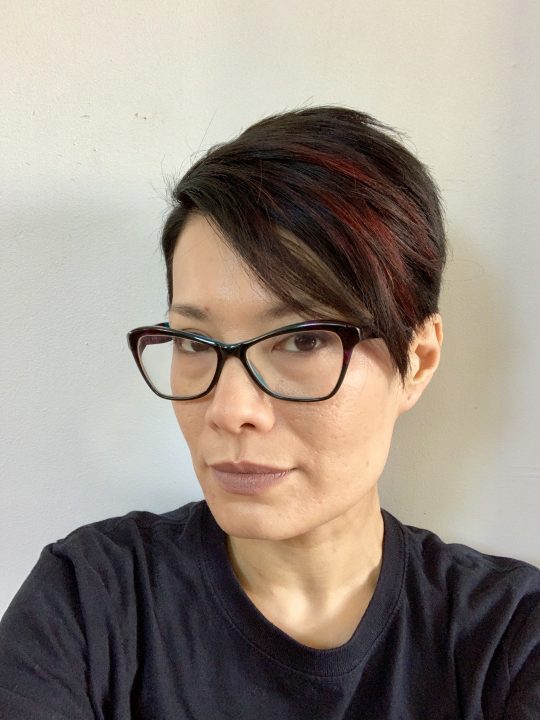
WITS Interview: Rika Kurdyla-Smith
September 25, 2021
by Gabriela Denise Frank
Throughout time, the powers of poets have been hailed as nothing short of mystical.
Poets are seers and oracles. They treat with gods, muses, ghosts. Their carefully crafted lines conjure images that, to readers and listeners, incarnate ephemeral ideas into forms solid enough to see and touch—at least by the mind.
How do they do that?! we ask, sometimes aloud, when shaken by a poem.
The poet Jane Hirshfield notes, “The writer, when she or he cannot write, is a person outside the gates of her own being.” Sylvia Plath said, “I write only because there is a voice within me that will not be still.” These powers must find a channel (the poet) and a vessel (the poem). Their numen cannot be contained.
These descriptions of the power of poetry—as inward portal to being-ness, as outward portal for freeing the spirit—came to mind when I heard Rika Kurdyla-Smith speak about her son, Julian, who wrote poetry for the first time with WITS Writer-in-Residence Samar Abulhassan.
“It was shocking to me that he had come up with these poems,” Rika said. “Julian had no idea about poetry, or how to write it before this. Miss Samar’s energy drew it out of the students. We all felt very safe in her class.”
Julian, who attended B. F. Day Elementary School, wrote a poem called “Homage to My Brain” with Samar.
“My son is in special ed, and he needed a lot of hands-on help,” Rika explained, “so I sat next to him the entire school year of virtual learning. We’re actually going to continue next year, because it worked out so well for us.”
She noted that Samar’s class was different than every other she observed.
“It was astonishing. Everybody’s attitude was different. You could feel this sense of creativity in the room. Everybody in class was so keen on giving it a shot…I don’t think there was one student that didn’t want to share their poem. Through Miss Samar’s guidance, every single poem that came out was pure and genuine and inspired. It was so much fun listening.”
Julian wrote about his mind. He wanted to express what it’s like to be a kid with ADHD. Rika said that Julian knew exactly what to write in response to Samar’s prompt. She laughed. “I was like, Oh, you do, huh? And he’s like, ‘Yeah, I do. Just write it.’ It’s him speaking of his condition, and how fast his brain works—and how slow his brain works—and everything he sees. He read it out loud, and told me, ‘This is exactly what I wanted to say.’ To be able to have that sort of outlet and freedom to be creative—it was new to him. It was such a great moment to share.”
I asked her what helped the students take these kinds of creative risks.
“Miss Samar has this incredible air about her—she is a very relaxed person—and she would enter the class and create the space with words. We all just felt a different vibe, a different air almost. She made everybody feel like it’s okay to make mistakes. It’s not about perfection—it was like, I want to hear how you’re feeling. I want to hear how you’re seeing things, and what is it that you want to say.”
The power to help others find their way—to open portals through poetry to the self and beyond—is the greatest craft a poet possesses. The image I picture is a fiery amber ring, like the ones Dr. Strange stretches open to transit through time.
“Julian and I would look at each other like, That was really good class,” Rika said. “He [was] so relaxed after. To be given permission to transport your thought processes and your brain into the creative space…it was just so amazing and magical.”
Rika paused and leaned in confessionally.
“I don’t know if it’s appropriate to say this, but it was like Miss Samar had this kind of sorcery happening where she just sort of said, Okay, here’s an idea, and here’s the format. Let’s work with that. And everyone was just like, Okay, let’s do it.”
The portals of poetry swing in many directions: teacher inspires students, students inspire each other, and students inspire teacher. Reading poems aloud in a group sets the cycle of creativity in motion: poems are released, heard, and absorbed—then remembered, felt, and recited again. Poem-spells spread like pollen on a windy day: once released into the world, they expand forever, alighting on one mind then the next.
“Creativity is an essential part of being human,” Rika said. Which is to say that reading poems may be the closet many of us will get to practicing magic—an essential power we can tap into any time by picking up a book—or a pen.
If you would like to support the Writers in the Schools program, there is still time to contribute to SAL’s annual WITS fundraiser, or you can donate any time here.
 Gabriela Denise Frank is a writer, editor, and creative writing instructor. Her essays and fiction have been published in True Story, Hunger Mountain, Bayou, Baltimore Review, Crab Creek Review, Pembroke, The Normal School, and The Rumpus. A Jack Straw Writer and Artist Trust EDGE alumna, Gabriela’s work is supported by 4Culture, Centrum, Mineral School, Vermont Studio Center, Invoking the Pause, and the Civita Institute. www.gabrieladenisefrank.com.
Gabriela Denise Frank is a writer, editor, and creative writing instructor. Her essays and fiction have been published in True Story, Hunger Mountain, Bayou, Baltimore Review, Crab Creek Review, Pembroke, The Normal School, and The Rumpus. A Jack Straw Writer and Artist Trust EDGE alumna, Gabriela’s work is supported by 4Culture, Centrum, Mineral School, Vermont Studio Center, Invoking the Pause, and the Civita Institute. www.gabrieladenisefrank.com.